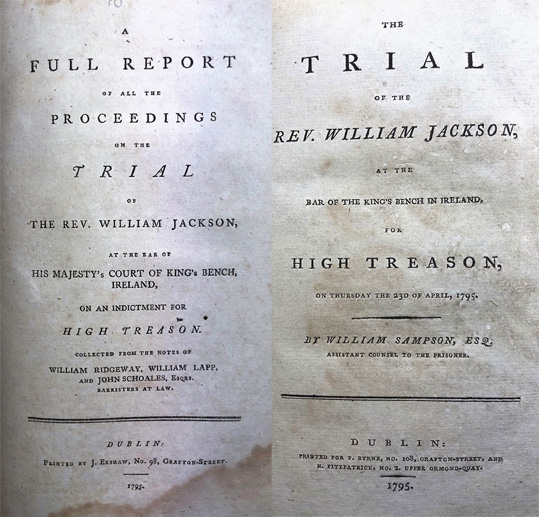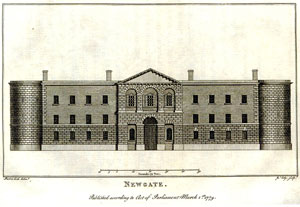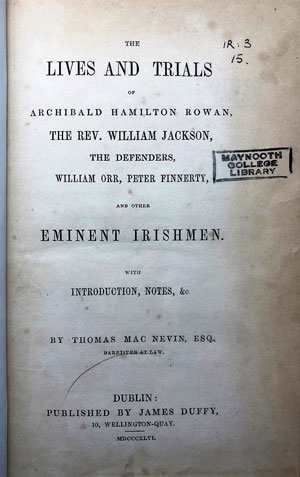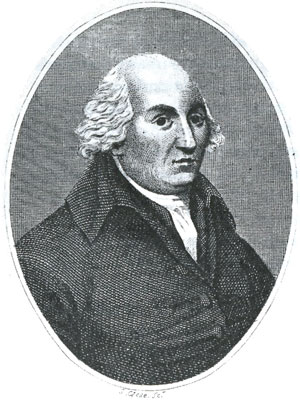THE TRIAL OF REVD WILLIAM JACKSON, APRIL 1795
Published in Features, Issue 1 (January/February 2023), Volume 31By Ruairí Nolan
One of the most extensive collections in the Russell Library at NUI Maynooth is that of material related to the late eighteenth century and the 1798 Rebellion, including various items relating to the trial of Revd William Jackson. Everything in this article is supported by these resources and secondary material; all quotations are drawn directly from the primary sources.
UNORTHODOX LIFE
William Jackson was a man who led an unorthodox life for a minister of the established church, better known for his contributions as a journalist and secretary to Elizabeth Chudleigh, Duchess of Kingston. For most of his life Jackson had been a constitutionalist, advocating for radical change through political action, but his philosophy changed in response to the French Revolution. Jackson would eventually come to advocate for militant action to achieve political reform, becoming involved in an espionage ring run through Paris under the Robespierre regime. This saw Jackson being sent on a mission to Britain and Ireland to gauge public support for direct French intervention—and a military invasion if palatable.
In the Russell Library there are two court reports that came from the junior counsel of both the Crown prosecutors (barristers Ridgeway, Lapp and Schoales) and the defence (assistant defence counsel William Sampson) that form part of a significant pamphlet collection. There is little disparity between them, although the Crown version serves as a superior account containing details of every interaction and appearance in court from Jackson’s arraignment, various delays, their reasons and the trial itself. These reports form the basis of another item in the collection, The life and trials of Archibald Hamilton Rowan, the Rev. William Jackson, the Defenders, William Orr, Peter Finnerty, and other eminent Irishmen. This book, written in 1846 by Young Irelander Thomas Mac Nevin, who in correspondence with R.R. Madden claimed to be distantly related to 1798 United Irish leader William James Mac Nevin, is one of the first histories of these events. Mac Nevin referred to and depended upon these reports for details but he also utilised W.H. Curran’s 1819 biography of defence counsel John Philpot Curran to fill in the more anecdotal details not found in official transcripts. The result is a well-rounded biography of Jackson and an accessible narrative account of his mission to Britain and Ireland and his subsequent trial in 1795.

Above: The contemporary reports of prosecution barristers Ridgeway, Lapp and Schoales (left) and assistant defence counsel William Sampson (right) on the trial of Revd William Jackson. (Russell Library, Maynooth University)
JACKSON’S MISSION
Jackson was sent to England in early 1795 to meet with a William Stone, initially to gauge what, if any, appetite existed for a French invasion. It is interesting to note that Jackson remained aloof for much of his time there, leaving Stone to carry out the work of meeting opposition politicians. This may have been because Jackson had garnered a reputation for accruing bad debts before he left for France—a possible reason for his increased radicalisation over the years. Stone was met with a resolute wall of disbelief and defiance. No matter the political affiliation, if England were invaded by France they could expect everyone to defend their homeland. In a letter intended for France, Jackson wrote ‘that 99 of 100 hands would be raised against them’.
He was thus getting ready to move on to Ireland but not before reviving a friendship with John Cockayne, a companion of some ten years or more. Jackson considered him such a valued friend that he confided his mission to him almost immediately. Cockayne had initially been helping Jackson with personal legal affairs, but he soon realised that a lot of the letters were poorly veiled attempts at conspiracy. When Jackson confided in Cockayne, the meaning of the letters became clear and Cockayne went straight to the office of the prime minister to prevent himself from being implicated in any such conspiracy. It is unclear whether Jackson invited Cockayne to Ireland with him or whether Pitt suggested it, but nonetheless Cockayne went and from this point on both Dublin Castle and Westminster were fully appraised of Jackson’s movements.
ARRIVAL IN IRELAND
When Jackson arrived in Ireland on 3 April 1794 his main objective was to meet with leading members of the Society of United Irishmen in Dublin. On the day he arrived he was hosted at Leonard McNally’s for dinner. There he was introduced to Simon Butler, chairman of the Dublin Society, and Edward Lewins, a member of Archibald Hamilton Rowan’s legal defence team. Butler laughed at the suggestion of a French intervention to forward their cause, since the United Irish Society at this point remained constitutional in its aims. Lewins, however, had been emerging as one of the more radical in the Society and through him Jackson was introduced to Rowan at Newgate Prison and, through Rowan, to Theobald Wolfe Tone.
Both Tone and Rowan showed a keen interest in new developments in France and were more than happy to host Jackson. Despite this, Jackson had difficulty in gaining the trust of the United Irishmen in general. William Drennan, a frequent visitor and long-time associate of the movement, had recused himself of any activity with Jackson, as did Lord Edward Fitzgerald. Fitzgerald shared the same sentiments as Jackson and expressed a desire for French intervention in Ireland as early as 1792 to Thomas Paine at White’s Hotel, an English-speaking enclave in the heart of Paris. Despite this, Fitzgerald refused to meet Jackson, believing it to be a ruse; Tone met him but remained reticent, thinking him an English agent provocateur sent to entrap United Irish leadership.
Rowan was taken with Jackson, however, and placed his faith in him totally from the outset—much to the consternation of Tone and Drennan, who thought his actions reckless. Jackson had wanted Tone to be the man to travel back to France and indicate Irish support for French intervention, but Tone refused. When another man was suggested for the trip Jackson dismissed the idea; if he could not send Tone, he would send nobody and would send the papers through the post instead.
Tone drafted a memorandum on the situation in Ireland and how willingly the Irish populace would welcome a military invasion. Shortly after this he began to have doubts about his position in these discussions, and he tried to retrieve the memorandum and have it destroyed. When he returned, Rowan had already made multiple copies, destroying the original, but Jackson had sent the copies through the open post on 27 April 1794. To accuse Jackson of callous recklessness, as some have, would be harsh. The only reason any of his papers were stopped at the Post Office was because John Cockayne had warned them to intercept any documents being sent to a William Stone or W. Enotts, whether from William Jackson or his pseudonym, Thomas Popkins. Jackson was arrested the following morning, 28 April, in his accommodation on Dame Street.
THE TRIAL

Above: Dublin’s Newgate Prison, Green Street, where Revd William Jackson was introduced to Archibald Hamilton Rowan and thence to Theobald Wolfe Tone.
The trial itself was, as the attorney general made clear at the initial indictment on 23 April 1795, ‘simple and uncomplicated … it is a clear, distinct species of treason, depending upon very simple evidence’. Nevertheless, the prosecution was uncertain whether it had a substantial witness. Tone had signed an agreement detailing the conversations he had with Jackson at Newgate in return for subjecting himself to exile. Since Rowan had by now escaped and nobody else was in an incriminating position regarding the affairs of Jackson, the only viable witness left was the former friend who informed on him, John Cockayne.
Cockayne was a reluctant witness, something which becomes clear while reading his cross-examination by both legal counsels. He was consistently weak in his answers and unable to give a comprehensive narrative of events despite being present for every meeting, including some where Jackson himself was absent. He was even pressed on the matter by a juror as to why he informed on his friend and was testifying against him if his ability to recount events was so poor. Cockayne simply stated that he had no intention of being nor was he expected to be a witness when he entered the business and so thought it unnecessary to be attentive to details.
Curran’s main defence in this trial was the character, or lack thereof, of Cockayne. He argued that the account given by Cockayne should not be used as evidence in a case of high treason. Curran himself states: ‘[Cockayne] does not venture to swear that he ever heard the conversation that … somebody was to go to France. He had ideas in his mind but never from any direct communication.’ Cockayne’s character was called into question. How could the jury accept the word of a man who betrayed a friendship of over a decade for what appears to have been a sizeable amount of money, somewhere between £300 and £600? Ponsonby, another member of the defence team, later pleaded with the jury: ‘Gentlemen, search well in your own hearts—ask them will they be satisfied upon the oath of such a single witness, to take away the life of any man?’
The jury took only 40 minutes of deliberation in the early hours of the morning of 24 April to determine that Jackson was guilty of high treason but recommended mercy owing to his age and general state of well-being.
Accounts of Jackson’s final hours are limited to these handful of sources in the Russell Library. Beyond the reports of Sampson and Ridgeway et al., there does not appear to be much else other than what is found in Mac Nevin’s account. We get reports of Jackson’s appearance on that day and his dramatic last words before dying in the stand. It appeared to many that in his final hours on the morning of 30 April 1795 Jackson had begun to regret the path he had taken. He was said to have been seen vomiting out of his carriage on the way to the courthouse that morning and appearing increasingly worried and uncomfortable.
‘WE HAVE DECEIVED THE SENATE’

Above: Thomas Mac Nevin’s The lives and trials of Archibald Hamilton Rowan … and other eminent Irishmen (1846) is based on the original 1795 reports but with the additional claim that Jackson’s dying words were ‘We have deceived the senate’. (Russell Library, Maynooth University)
Rather than regret, MacNevin records it in a different light: ‘[Jackson] beckoned to his counsel to approach him … and uttered in a whisper, and with a smile of mournful triumph, the dying words of Pierre, “We have deceived the senate”.’ Once in the dock, Jackson began to deteriorate before the court, to the point of needing a chair. Eventually a doctor was called to assist, who immediately stated: ‘I think him verging to eternity, he has every symptom of death about him’. One can imagine the scene and the effect it must have had upon the court, one eyewitness stating that ‘whoever was present must recollect it as one of the most touching and uncommon scenes … during that eventful period’. An inquiry found Jackson to have ingested a lethal dose of metallic poison, likely administered by his wife, who had been allowed to visit him at Newgate on the morning of his sentencing hearing.
His final words, an ode to the character of Pierre in Thomas Otway’s Venice Preserv’d can be interpreted in two ways. Otway’s production, from the Restoration era, was particularly controversial in 1790s Britain for its radical political imagery—a fitting reference for Jackson to make. This can be seen as a last stand for Jackson, a defiance to the end, representing his political philosophy. Another interpretation, attested to by Seamus Deane, is that Venice Preserv’d was primarily a celebration of male friendship. In the play Pierre was betrayed to the Senate by his friend Jaffeir. The betrayal premise provides some apt parallels between Jackson and Cockayne’s friendship. Unlike Jackson, the jury is still out on the debate over which interpretation fits the bill.
A month after Jackson’s arrest, in May 1794, the Society of United Irishmen was suppressed by the government, forcing it underground. It became more secretive, utilising oaths and handshakes and becoming the exclusive underground network that many within its ranks had been desirous of for years. The subsequent publicisation of Jackson’s trial and the refusal of the Camden administration the following year to implement any further Catholic relief legislation had the opposite effect than intended. Rather than being a deterrent for supporters of insurrection, it planted in the minds of many that there was an alternative to the tyranny of Dublin Castle. People came to consider what life could be like under French rule as a sister republic, one of liberty and equality, where Catholics had their rights returned to them.
Instead of discouraging dissent, the suppression of the United Irishmen served as a catalyst for radicalisation. The government pushed the two most disaffected groups in the country into one another’s arms in the summer of 1795. Thus, while a result of multiple factors, it was the arrest and subsequent trial of William Jackson that lit the fuse and began the process of the radicalisation of the United Irishmen. Finding common cause, they and the Defenders (a Catholic agrarian secret society) would join forces by late 1795/early 1796—formally militarising the United Irishmen and completing a transition much like Jackson’s own political evolution, from staunch constitutionalists to militant revolutionaries.
Ruairí Nolan is a library assistant in the National Library of Ireland.
Further reading
S. Deane, ‘Tone: the great nation and the evil empire’, in S. Deane, Small world: Ireland 1798–2018 (Cambridge, 2021), 34–73.
M. Elliot, Partners in revolution (Yale, 1988).
M. Elliot, Wolfe Tone: prophet of Irish independence (2nd edn) (Liverpool, 2017).

















